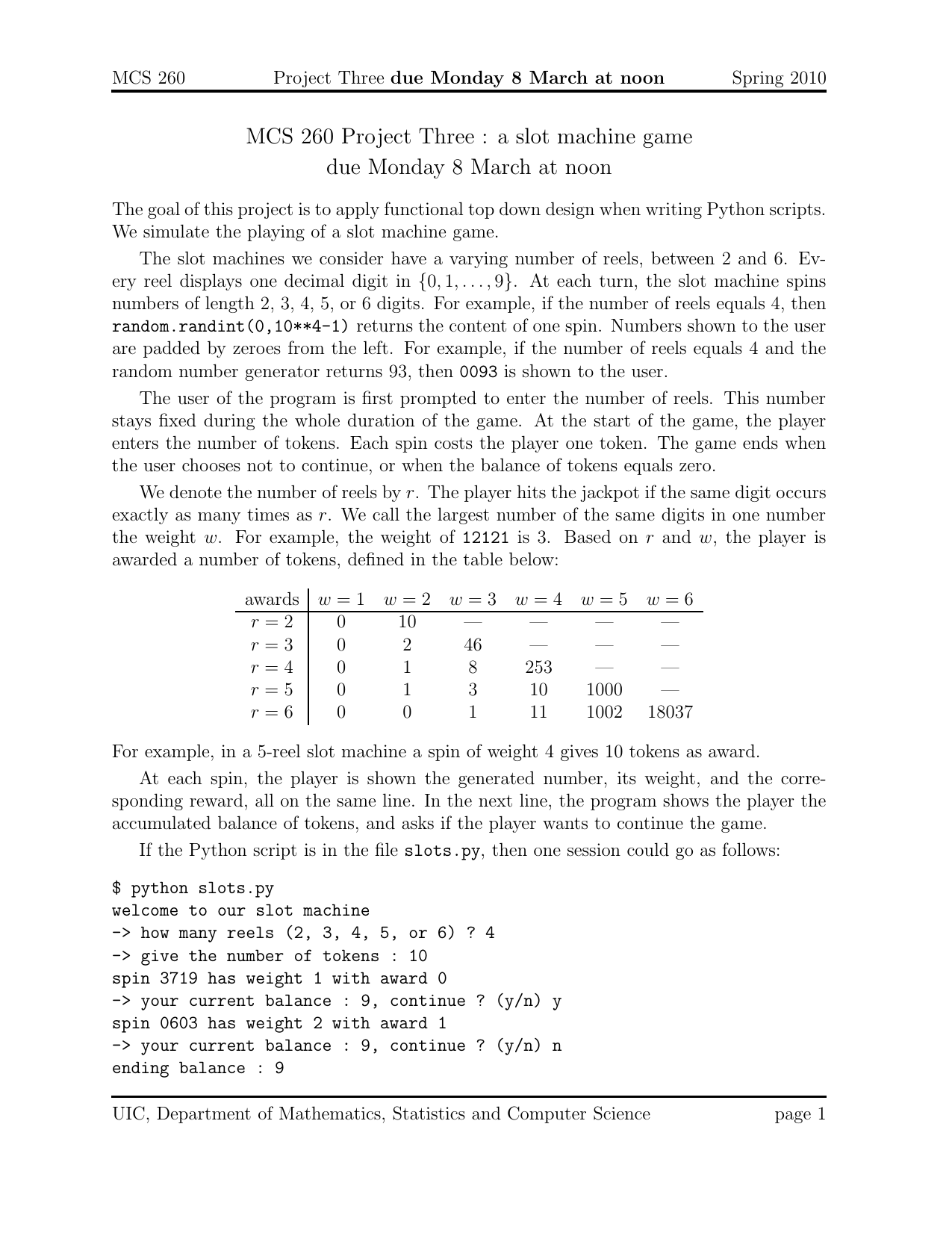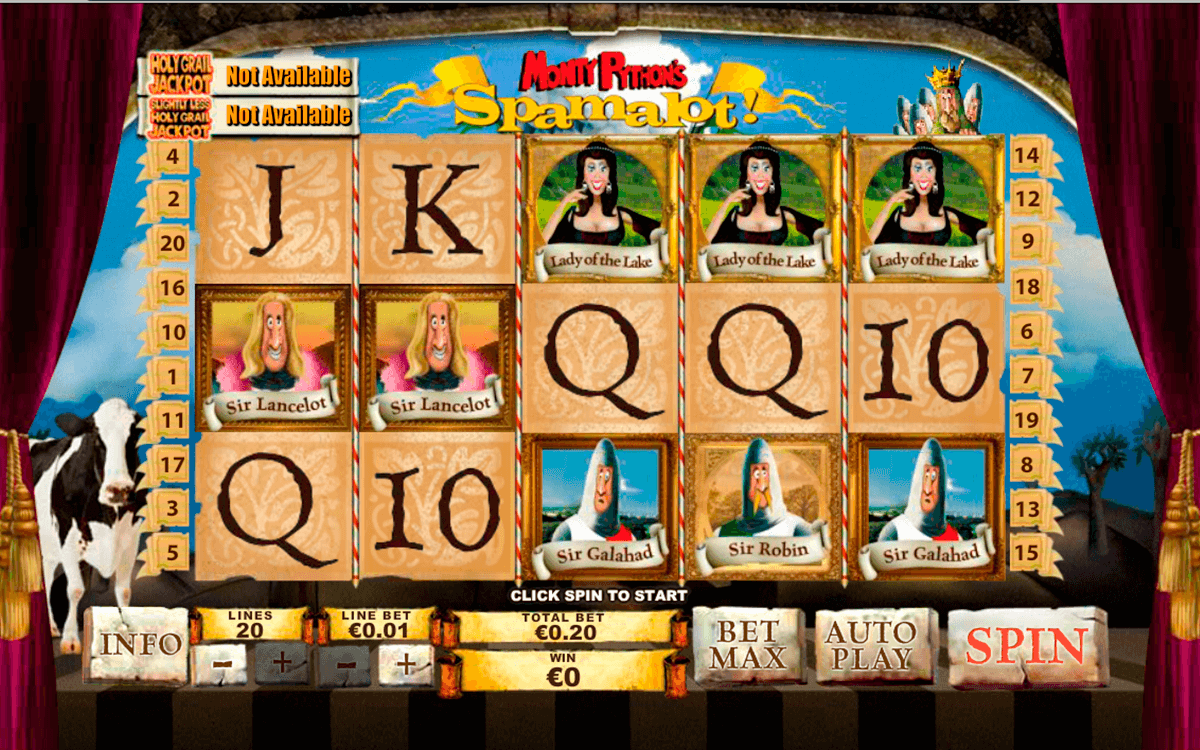
I'm programming a slot machine for school and cannot get the machine to re-run once it is finished. I am relatively new and would like some honest feedback. How can I get my program to re-run? Slot Machine in Python Encapsulate functionality in a class. I'd create a class called SlotMachine that holds the global state. It should store. Keep related constants in an Enum. This also helps avoid. (16) 16 product ratings - Brybelly 1000-Count Cherry Slot Machine Tokens – Premium Pachislo & IGT Slot. Bally Alpha Elite S9000 CPU MPU With 1GHz Slot Machine. Bally 6000 or 9000 Slot Machine. Monty Python's Spamalot proved to be an immensely popular online slots machine for Playtech when it was released several years ago.This progressive jackpot is now joined by a new Monty Python slot. Monty Python and the Holy Grail Slots. Having figured out the Meaning of Life, and having had us racing through the hectic Life of Brian, it's time us diehard real cash slot fans play Monty Python and the Holy.

Next Chapter: A Python Class for Polynomial Functions

Slots
Avoiding Dynamically Created Attributes

Monty Python Slot Machine
The attributes of objects are stored in a dictionary __dict__. Like any other dictionary, a dictionary used for attribute storage doesn't have a fixed number of elements. In other words, you can add elements to dictionaries after they are defined, as we have seen in our chapter on dictionaries. This is the reason, why you can dynamically add attributes to objects of classes that we have created so far:
The dictionary containing the attributes of 'a' can be accessed like this:
You might have wondered that you can dynamically add attributes to the classes, we have defined so far, but that you can't do this with built-in classes like 'int', or 'list':
Using a dictionary for attribute storage is very convenient, but it can mean a waste of space for objects, which have only a small amount of instance variables. The space consumption can become critical when creating large numbers of instances. Slots are a nice way to work around this space consumption problem. Instead of having a dynamic dict that allows adding attributes to objects dynamically, slots provide a static structure which prohibits additions after the creation of an instance.

I'm programming a slot machine for school and cannot get the machine to re-run once it is finished. I am relatively new and would like some honest feedback. How can I get my program to re-run? Slot Machine in Python Encapsulate functionality in a class. I'd create a class called SlotMachine that holds the global state. It should store. Keep related constants in an Enum. This also helps avoid. (16) 16 product ratings - Brybelly 1000-Count Cherry Slot Machine Tokens – Premium Pachislo & IGT Slot. Bally Alpha Elite S9000 CPU MPU With 1GHz Slot Machine. Bally 6000 or 9000 Slot Machine. Monty Python's Spamalot proved to be an immensely popular online slots machine for Playtech when it was released several years ago.This progressive jackpot is now joined by a new Monty Python slot. Monty Python and the Holy Grail Slots. Having figured out the Meaning of Life, and having had us racing through the hectic Life of Brian, it's time us diehard real cash slot fans play Monty Python and the Holy.
Next Chapter: A Python Class for Polynomial Functions
Slots
Avoiding Dynamically Created Attributes
Monty Python Slot Machine
The attributes of objects are stored in a dictionary __dict__. Like any other dictionary, a dictionary used for attribute storage doesn't have a fixed number of elements. In other words, you can add elements to dictionaries after they are defined, as we have seen in our chapter on dictionaries. This is the reason, why you can dynamically add attributes to objects of classes that we have created so far:
The dictionary containing the attributes of 'a' can be accessed like this:
You might have wondered that you can dynamically add attributes to the classes, we have defined so far, but that you can't do this with built-in classes like 'int', or 'list':
Using a dictionary for attribute storage is very convenient, but it can mean a waste of space for objects, which have only a small amount of instance variables. The space consumption can become critical when creating large numbers of instances. Slots are a nice way to work around this space consumption problem. Instead of having a dynamic dict that allows adding attributes to objects dynamically, slots provide a static structure which prohibits additions after the creation of an instance.
Monty Python Slot Machine Locations
When we design a class, we can use slots to prevent the dynamic creation of attributes. To define slots, you have to define a list with the name __slots__. The list has to contain all the attributes, you want to use. We demonstrate this in the following class, in which the slots list contains only the name for an attribute 'val'.
If we start this program, we can see, that it is not possible to create dynamically a new attribute. We fail to create an attribute 'new'.
We mentioned in the beginning that slots are preventing a waste of space with objects. Since Python 3.3 this advantage is not as impressive any more. With Python 3.3 Key-Sharing Dictionaries are used for the storage of objects. The attributes of the instances are capable of sharing part of their internal storage between each other, i.e. the part which stores the keys and their corresponding hashes. This helps reducing the memory consumption of programs, which create many instances of non-builtin types.
Next Chapter: A Python Class for Polynomial Functions

